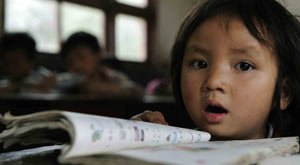Boy's death highlights tragedy of 'left-behind' children
Xinhua News Agency, January 27, 2014 Adjust font size:
Xiao Lin went to school to pick up his academic report alone, while most of his schoolmates were accompanied by their parents.
Nine-year-old Lin (pseudonym), whose divorced parents had been working outside his hometown for years, looked a bit down with his disappointing scores on Monday, according to a village cadre in Sige Village in Wangjiang County of east China's Anhui Province.
Lin's mum made a phone call to the family during supper that night, saying that she would not be home for the Lunar New Year, the second year that Lin was not going to see her. Lin was silent during supper. He ate by the doorway staring into the distance.
No one thought that Lin was planning to end his life. He strangled himself in the toilet that night, days away from Spring Festival. He left no note.
Lin was one of China's vast number of "left-behind" migrant children. His father went to work outside the village, less than 30 days after Lin was born.
"Left-behind" children are those who remain in rural homes while their parents go to work in cities to earn a living. The children are usually taken care of by their grandparents or other relatives. China's "left-behind" population is nearing 100 million.
Lin's mum became a migrant worker when she and her husband divorced two years ago. The boy was transferred to an elementary school near his step-father's home village, also in Anhui Province. He was then transferred back half a year later to the school he had originally attended.
Lin's parents never went to school to pick up his academic reports with him, nor had they ever attended parents' meetings, enhancing his insecurities, according to Yang Qinglin, the school's headmaster.
"He was more well-behaved than his schoolmates, because he knew no one was going to defend him if he caused trouble at school," Yang said.
Lin rarely received a phone call from his parents.
In fact, even after he ended his life, his father appeared indifferent, reluctant to return home from the city where he was struggling to make money.
A day before Lin killed himself, two "left-behind" girls aged 9 and 10 in central Hunan Province secretly took a train to meet their parents in Zhaoqing City in southern China's Guangdong Province.
In November, an 11-year-old boy from Hubei Province went to look for his parents in Beijing with less than 100 yuan (16.5 U.S. dollars) he had saved. He ended up in another place. He was later found by police and sent home.
Sang Qingsong, a professor with Anhui Normal University, said that the lack of parental love and care towards "left-behind" children created a sense of helplessness and abandonment in them.
According to an All-China Women's Federation report in May, problems facing "left-behind" and migrant children, including a lack of family closeness, security, protection and educational opportunities, have not been resolved. Problems keep emerging.
Sang said that Lin's case, like others, is an outcry for love, and that measures should be taken to prevent the situation from worsening.
"The government should continue efforts in allowing these children to go to where their parents work and guaranteeing their basic rights like education and medical care," he said.
He added that it is important to prompt Chinese enterprises to start businesses in the countryside so that farmers can work near where they live, which would decrease the number of "left-behind" children.
"Society should give more care and love to people like Lin so that such a tragedy will not happen again," Sang said.
About 260 million Chinese farmers have become migrant workers in cities. Spring Festival, or Chinese Lunar New Year, is often the only chance for them to see their children and family back in their rural homes.
A non-governmental organization report on China's "left-behind" children released in September showed that offspring of migrant workers are more likely to become victims of sexual assault.
The report found "left-behind" girls are most vulnerable to sexual offences in less-developed regions.
Jointly released by the China Children and Teenagers' Fund and the Research Center for Philanthropy and Social Enterprise under Beijing Normal University, the report was based on analysis of questionnaires and field studies in Guangdong, Guizhou and Jilin provinces.


